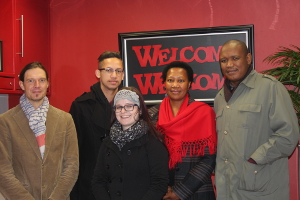
Front row, from the left: Frans Kruger, Lecturer: School of Education Studies; Trudie Strauss, Lecturer, Mathematical Statistics and Actuarial Science
Back row, from the left: Johnathan Adams, Teaching Assistant: Centre for Teaching and Learning; Moliehi Rosemary Mpeli, Lecturer: School of Nursing; Ncedo Xhala, Research Assistant: Quantity Surveying and Construction Management.
Photo: Mamosa Makaya |
The grantees of the 2015 Erasmus Mundus programme have been announced, and will soon head off to various institutions at European universities to embark on academic and professional exchange programmes. The cohort is made up of some of the best, most talented staff of the university, who are currently studying towards master’s and PhD programmes in fields such as Mathematics and Actuarial Sciences, Quantity Surveying, Bioethics, and Education.
The Erasmus Mundus programme is an international partnership that enhances academic cooperation between institutions of higher education in South Africa and the European Union, and has within it the EUROSA, EU Saturn and INSPIRE programmes. It aims to promote inter-cultural understanding, and the development of both European and Third-Country universities. The UFS has participated in the programme since 2010. In 2014, 13 staff members were granted PhD and master’s study programmes for a period of up to 22 months in various fields such as Communication Science, Urban and Regional Planning and Law, at among others, the Universities of Ghent, Antwerp Tilburg and Uppsala.